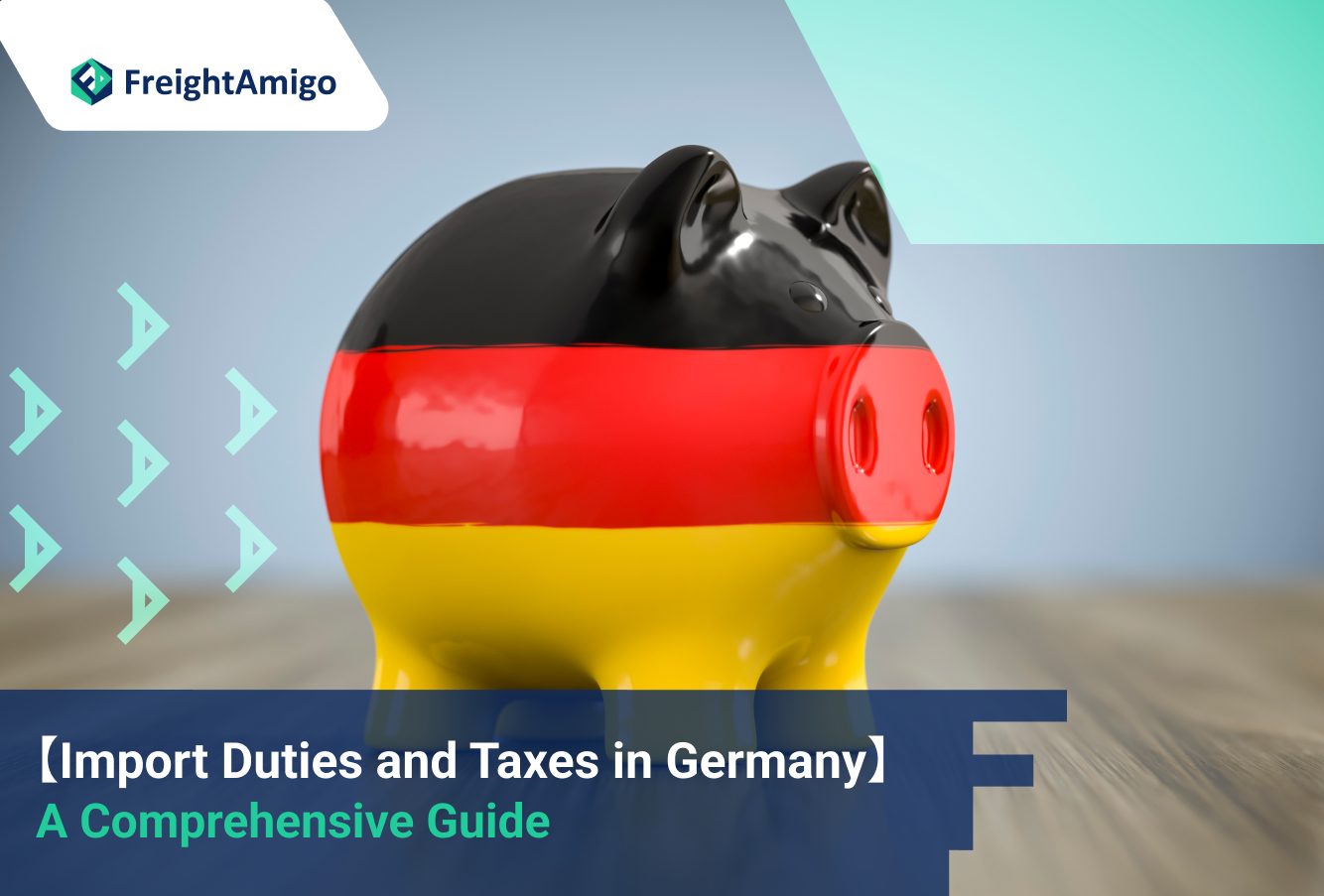Germany, with its thriving economy and robust ecommerce market, presents an attractive opportunity for businesses looking to expand their global footprint. However, it’s essential to understand the intricacies of importing duties and taxes to ensure a smooth and compliant entry into the German market. This guide aims to provide a comprehensive overview of the duties and taxes associated with importing goods into Germany.
Latest update on 20 February, 2024 by Caspian Ng– Marketing Analyst at FreightAmigo
Want to compare the best Express, Air Freight, Sea Freight, Rail Freight & Trucking rates so as to have better control on cost?
Understanding Importing Regulations
Classification and Tariffs
When goods enter the European Union (EU), including Germany, they need to be declared to customs based on their classification in the Combined Nomenclature (CN). The CN document is updated annually and can be found on the European Commission’s website. U.S. exporters should consult the Integrated Tariff of the Community (TARIC) to identify the specific rules that apply to their products.
The TARIC is a valuable resource that can be searched by country of origin, Harmonized System (HS) code, and product description. It provides information on the applicable tariffs, licensing requirements, and any additional measures that may affect the importation process.
De Minimis Thresholds
Germany has de minimis thresholds that determine whether duties and taxes are applicable to imports. The duty de minimis value is set at 150 EUR, which means that imports with a total CIF value below this threshold are exempt from duty charges. However, it’s important to note that all imports are subject to value-added tax (VAT), as Germany has a tax de minimis value of 0 EUR.
Value-Added Tax (VAT)
Import VAT is charged on the CIF (cost, insurance, freight) value of the order. The standard VAT rate in Germany is 19%, but certain products, such as food, books, hotel accommodations, and cultural services, may qualify for a reduced rate of 7%. It’s crucial to ensure compliance with VAT regulations and consider employing the Import-One-Stop-Shop (IOSS) system for collecting and remitting VAT.
Import Duty Rates
Import duties in Germany vary depending on the product category and its classification in the TARIC. The average duty rate is approximately 4.2%, but it’s essential to consult the TARIC and seek professional advice to determine the specific duty rate applicable to your goods.
Customs Procedures and Documentation
Customs Declarations
To import goods into Germany, businesses must complete customs declarations. The Single Administrative Document (SAD) and Summary declaration are commonly used documents for this purpose. It’s crucial to provide accurate and detailed information about the goods being imported to ensure smooth customs clearance.
Economic Operators Registration and Identification (EORI)
Businesses engaged in importation activities within the EU, including Germany, need to obtain an Economic Operators Registration and Identification (EORI) number. This unique identifier streamlines customs procedures and is required for business-to-business shipments. However, business-to-consumer shipments may not require an EORI number upon import.
Customs Refunds
In certain cases, businesses may be eligible for customs refunds. It’s essential to consult with the respective carrier or logistics provider regarding customs refund procedures and requirements.
Shipping and Logistics Considerations
Courier Services
Germany benefits from a well-established logistics infrastructure, and all major couriers, including DHL Express, FedEx, UPS, USPS, Hermes, DPD, and GLS, provide shipping services to the country. It’s advisable to choose a reputable courier service that offers reliable tracking, insurance options, and competitive rates.
Import Control System 2 (ICS2)
ICS2 is a cargo information system implemented by the European Union to enhance security and safety measures for shipments entering or transiting the EU. It’s crucial to provide accurate and detailed package descriptions to ensure compliance with ICS2 requirements.
Additional Shipping Fees
When shipping goods to Germany, businesses should consider potential additional fees that may be applicable, such as tracking fees, insurance fees, fuel surcharges, remote delivery charges, signature fees, overweight or oversized fees, special handling fees, and dangerous goods fees. It’s advisable to clarify these fees with the chosen courier service in advance.
Documentation and Paperwork
Required documentation for importing goods into Germany typically includes a bill of lading or air waybill and a commercial invoice. Additionally, depending on the specific circumstances, businesses may need to provide an Economic Operators Registration Identification (EORI) number, a Tax ID number, and a Germany Power of Attorney (POA) form for customs clearance purposes.
Restricted and Prohibited Items
Germany, like any other country, imposes restrictions and prohibitions on certain goods. It’s crucial to familiarize oneself with the regulations governing imports to ensure compliance. Prohibited items, such as counterfeit goods, fully automatic weapons, and certain chemicals, are strictly forbidden from entering the country. Restricted items, such as animal carcasses, drugs, and textiles, may require special licenses or approvals for importation.
Business Regulations and Compliance
Classification of Goods
To ensure compliance with customs regulations, goods must be correctly classified using the Combined Nomenclature (CN). The CN provides a standardized system for classifying goods and is updated annually. It’s essential to accurately classify goods to determine the applicable duties, taxes, and regulatory requirements.
VAT Rules and Rates
Each EU member state, including Germany, applies VAT rules differently, leading to variations in VAT rates. It’s crucial to understand the specific VAT rules and rates applicable to your goods and adjust pricing and invoicing accordingly.
Conclusion
Navigating the complexities of importing duties and taxes in Germany is crucial for businesses seeking to expand into this vibrant market. By understanding the classification and tariff systems, familiarizing oneself with customs procedures and documentation, and ensuring compliance with shipping and logistics requirements, businesses can successfully navigate the import process. It’s advisable to consult with legal and tax professionals to ensure adherence to current regulations and optimize the importation experience.
There are different options for cargo transportation. If you want to choose the most convenient and suitable solution, it is best to have the full support of logistics experts! If you are planning to transform your warehouse operations, please go to the FreightAmigo page for inquiries.
Read More:
Shipping from Hong Kong to Germany | FreightAmigo
The Art of Order Fulfillment | Strategies for Success in an E-commerce World | FreightAmigo
Maximizing Efficiency | Crucial Role of Fulfillment Services | FreightAmigo
If you have any inquiries on logistics/supply chain, feel free to contact FreightAmigo now:
Chat with us online | Hotline: +852 28121686 | WhatsApp: +852 27467829









































